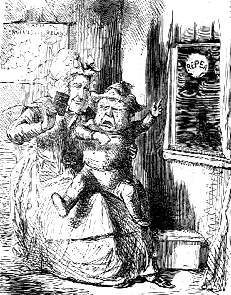

 he mid-nineteenth century was an especially strenuous time for Anglo-Irish relations. The Irish Famine, 1845-1848, [see note below: ASW] was the worst agricultural disaster to ever hit Ireland. England helped subsidize the Irish through government loans and private donations, but many saw the blight as an Irish problem forced upon the English people; while in Ireland there was bitterness towards England for not providing greater and more efficient help. Daniel O'Connell's movement for the retraction of the union between Ireland and England was born out of this disquiet. Repeal would increased Ireland's autonomy by re-establishing the Irish legislature, which was voted out of existence in 1800. At around the same time (early 1845), Liberal Prime Minister Robert
Peel decided to increase the financial assistance to the Roman Catholic training college at Maynooth. This caused great discord among many Englishmen, who viewed the Maynooth issue as favoring the Irish Catholic Church over the established Anglican Church of Ireland.
he mid-nineteenth century was an especially strenuous time for Anglo-Irish relations. The Irish Famine, 1845-1848, [see note below: ASW] was the worst agricultural disaster to ever hit Ireland. England helped subsidize the Irish through government loans and private donations, but many saw the blight as an Irish problem forced upon the English people; while in Ireland there was bitterness towards England for not providing greater and more efficient help. Daniel O'Connell's movement for the retraction of the union between Ireland and England was born out of this disquiet. Repeal would increased Ireland's autonomy by re-establishing the Irish legislature, which was voted out of existence in 1800. At around the same time (early 1845), Liberal Prime Minister Robert
Peel decided to increase the financial assistance to the Roman Catholic training college at Maynooth. This caused great discord among many Englishmen, who viewed the Maynooth issue as favoring the Irish Catholic Church over the established Anglican Church of Ireland. Punch's charicature, The Greedy Boy Who Cried For the Moon, depicts the common nineteenth century perception of Ireland as an insufferable child. It exemplifies the belief by many in England that the right to govern Ireland was due to the Anglo-Saxon's innate maturity and sensibility. In this illustration, Nanny England (Prime Minister Peel) tries to pacify temperamental Ireland by giving her the Maynooth grant. Ireland can not be satisfied, and only wants the intangible moon. The moon is Irish nationalists' dream of repealing the country's union with England. Peel does not acknowledge the moon, representing many Englishmen's opinion that autonomy was beyond the grasp of childish Ireland. The country is not seen as the primitive, ape-like figure she will become later in the century with the rise of Fenian terrorism. The depiction of Ireland is nevertheless extremely derogatory. She is portrayed as overfed and too large to sit on England's lap. Her weight is not a sign of growth, but rather an indication of a spoiled child. England's pragmatism keeps herself in the dominant position, while Ireland's volatility confines her to a child-like representation. England's concern about Ireland's instability kept repeal from Ireland until the twentieth century.
The commemoration of the 150th anniversary of the Irish Famine has led to some superb web sites on the subject - - analyses, extracts from the Illustrated London News, and famine songs. For a selection of these see:
[A.S. Wohl].
[Victorian initial "T" by Harlan Wallach ©copyright 1994.]